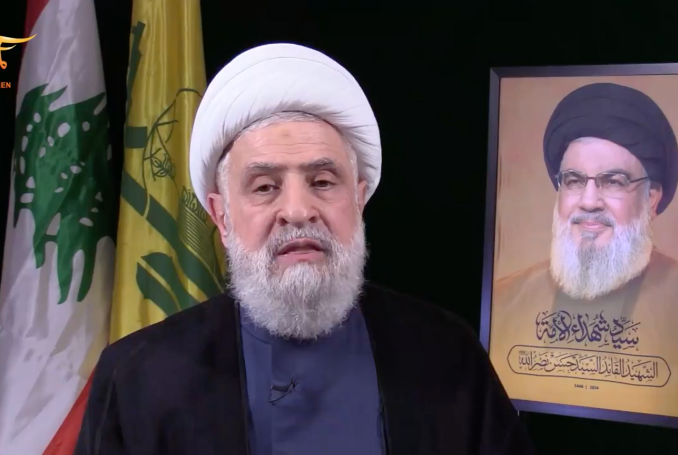
Hezbollah Secretary-General Sheikh Naim Qassem addressed significant local and regional issues on Saturday evening, including the recent Israeli war on Lebanon and developments in Syria.
In a televised speech, Sheikh Qassem stated that Hezbollah had anticipated Israeli aggression against Lebanon at any time, although the exact timing was unknown. This expectation, he noted, existed both before and after the Al-Aqsa Flood Operation, carried out by the Palestinian Resistance on October 7, 2023.
He noted that the Israeli aggression launched in September was not linked to Hezbollah’s support for Gaza but was instead tied to Israel’s expansionist ambitions.
Qassem said that during the war, Israel managed to assassinate key Hezbollah figures, including the group’s former Secretary-General Sayyed Hassan Nasrallah, and committed atrocities against civilians.
However, he emphasized that the Resistance fighters succeeded “to inflict pain on the enemy, engage in combat, wound hundreds of its soldiers, and prevent it from achieving its goal of crushing the Resistance.”
“Hezbollah is strong and is recovering from its wounds”
Hezbollah leader Sheikh Naim Qassem says those who wished to see the end of Hezbollah have been disappointed.
Follow us on Telegram: https://t.co/B3zXG74hnU pic.twitter.com/RidUOgtkre
— Press TV 🔻 (@PressTV) December 14, 2024
Hezbollah’s leader reiterated that the Resistance had successfully thwarted Israel’s objectives in the war and displaced its settlers, asserting that the occupation’s efforts to weaken the Lebanese movement had failed.
“The only achievement the enemy made was causing us pain by killing our commanders,” he remarked.
Sheikh Qassem further stated that “the enemy seeks to eliminate any resistance that stands in the way of its regional project,” emphasizing that “the aggression is the problem, not the resistance” and affirming that the Resistance would never surrender.
He underscored Hezbollah’s success in blocking Israel’s primary goal of destroying the Resistance and relocating displaced Israeli settlers to northern Israel without any agreement.
“The enemy realized that the prospect of confronting Hezbollah’s Resistance was blocked, so it resorted to an agreement to halt the aggression,” he added.
Sheikh Qassem asserted that Hezbollah had “prevented the enemy from entering the New Middle East with Lebanon being its gateway,” stressing that without the steadfastness of the Resistance fighters, Israel would have reached Beirut and initiated its plans for settlement and colonization.
“These are sacrifices that make the resistance what it is”
Hezbollah chief Sheikh Naim Qassem says sacrifices made by the resistance are the price it has paid for its continuation.
Follow us on Telegram: https://t.co/B3zXG73Jym pic.twitter.com/xVn9OuiG03
— Press TV 🔻 (@PressTV) December 14, 2024
Addressing the ongoing Israeli violations of the ceasefire agreement, Sheikh Qassem noted that Hezbollah had tolerated numerous breaches to facilitate the deal’s implementation and avoid obstructing efforts.
However, he asserted that the Lebanese government and the committee overseeing the agreement are responsible for addressing these violations.
Looking ahead, Sheikh Qassem outlined Hezbollah’s priorities, including implementing the agreement south of the Litani River, advancing reconstruction efforts, electing a new president for Lebanon, engaging in positive dialogue on critical issues such as Lebanon’s stance on the Israeli occupation, strengthening the Lebanese Army, and formulating a national defense strategy.
Turning to Syria, Sheikh Qassem discussed the country’s evolving political landscape, noting that Assad’s government had fallen under the control of new forces. He added that these forces can only be assessed once they stabilize and adopt clear positions.
He acknowledged the loss of a military supply route through Syria but downplayed its importance, calling it “a minor detail” and emphasizing Hezbollah’s ability to adapt to changing circumstances.
Despite ongoing challenges in Syria, Sheikh Qassem expressed confidence that these developments would not adversely affect Lebanon and voiced hope for Syria’s stabilization in line with the aspirations of its people.
“We supported Syria because it was positioned against Israel,” Sheikh Qassem said, expressing optimism that Syria’s new leadership would continue to see Israel as an enemy and refrain from normalizing relations with it.
(PC, Al-Mayadeen)